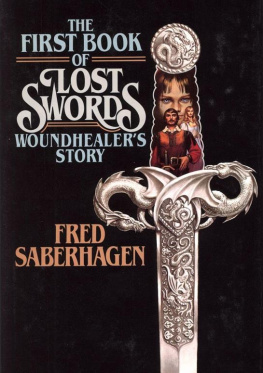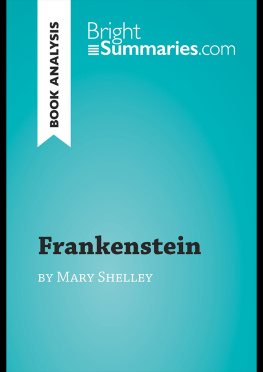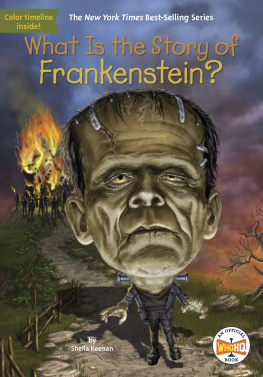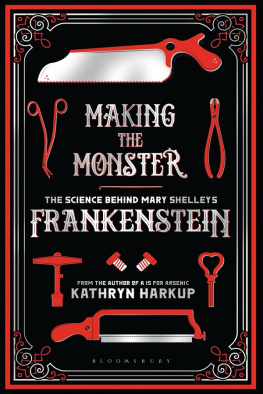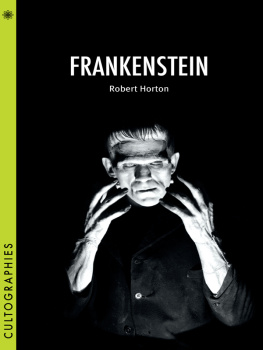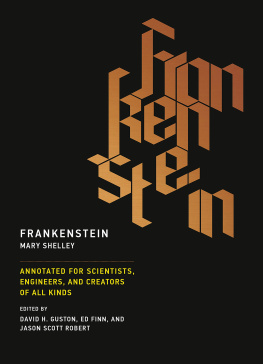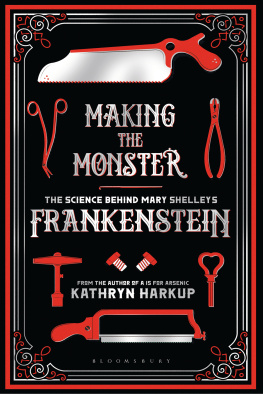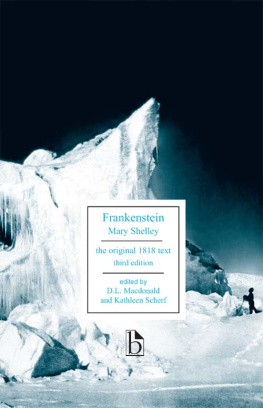Fred Saberhagen - The Frankenstein Papers
Here you can read online Fred Saberhagen - The Frankenstein Papers full text of the book (entire story) in english for free. Download pdf and epub, get meaning, cover and reviews about this ebook. year: 2011, genre: History. Description of the work, (preface) as well as reviews are available. Best literature library LitArk.com created for fans of good reading and offers a wide selection of genres:
Romance novel
Science fiction
Adventure
Detective
Science
History
Home and family
Prose
Art
Politics
Computer
Non-fiction
Religion
Business
Children
Humor
Choose a favorite category and find really read worthwhile books. Enjoy immersion in the world of imagination, feel the emotions of the characters or learn something new for yourself, make an fascinating discovery.

- Book:The Frankenstein Papers
- Author:
- Genre:
- Year:2011
- Rating:3 / 5
- Favourites:Add to favourites
- Your mark:
- 60
- 1
- 2
- 3
- 4
- 5
The Frankenstein Papers: summary, description and annotation
We offer to read an annotation, description, summary or preface (depends on what the author of the book "The Frankenstein Papers" wrote himself). If you haven't found the necessary information about the book — write in the comments, we will try to find it.
The Frankenstein Papers — read online for free the complete book (whole text) full work
Below is the text of the book, divided by pages. System saving the place of the last page read, allows you to conveniently read the book "The Frankenstein Papers" online for free, without having to search again every time where you left off. Put a bookmark, and you can go to the page where you finished reading at any time.
Font size:
Interval:
Bookmark:
FRANKENSTEIN PAPERS
By
Fred Saberhagen
THE BIRTH OF A MONSTER
"It was on a dreary night of November that I beheld the accomplishments of my toils. With an anxiety that almost amounted to agony, I collected the instruments of life around me, that I might infuse a spark of being into the lifeless thing that lay at my feet. It was already one in the morning; the rain pattered dismally against the panes, and my candle was nearly burnt out, when by the glimmer of the half-extinguished light I saw the dull yellow eye of the creature open; it breathed hard, and a convulsive motion agitated its limbs"
That is Mary Shelley's version of what happened on that dark and stormy night. Now learn the awful truth
Of Medical Electricity
The first application of electricity to the cure of diseases was made by M. Jallabert, professor of philosophy at Geneva, on a locksmith whose right arm had been paralytic fifteen yearsHe was brought to M. Jallabert on the 26th of December 1747, and was compleatly cured by the 28th of February 1748. In this interval he was frequently electrified, sparks being taken from the arm, and sometimes the electrical shock sent through it.
Dr. Franklin and others mention some paralytic cases, in which electricity seemed rather to make the patient worse than better.
Mr. Wilson cured a woman of a deafness of seventeen years standingand Mr. Lovet considers electricity as a specific in all cases of violent pains, obstinate headacnes, the sciatica, and the cramp. The toothache, he says, is generally cured by it in an inftant. He relates a case, from Mr. Sloyer surgeon at Dorchester, of a compleat cure of a gutta ferena; and another of obstinate obstructions in two young women.
Hitherto electricity has been generally applied to the human body either in the method of drawing sparks, as it is called, or of giving shocks. But these operations are both violent, and though the strong concussion may suit some cases, it may be of disservice in others, where a moderate simple electrification might have been of use.
The great objection to this method is the tediousness and expence of the application. But an electrical machine might be contrived to go by wind or water, and a convenient room might be annexed to it, in which a floor might be raised upon electrics, a person might fit down, read, sleep, or even walk about during the electrification.
It were to be willed, that some physician of understanding and spirit would provide himself with such a machine and room. No harm could possibly be apprehended from electricity, applied in this gentle and intensible manner, and good effects are at least possible, if not highly probable.
Chapter 1
May? 1782?
I bite the bear.
I bit the bear.
I have bitten the white bear, and the taste of its blood has given me strength. Not physical strength_that I have never lackedbut the confidence to manage my own destiny as best I can.
With this confidence, my life begins anew. That I may think anew, and act anew, from this time on I will write in English, here on this English ship. My command of that language is more than adequate, though how that ever came to be God alone can know.
How I have come to be, God perhaps does not know. It may be that that knowledge is, or was, reserved to one other, who hasor hadmore right than God to be called my Creator.
My first object in beginning this journal is to cling to the fierce sense of purpose that has been reborn in me. My second is to try to keep myself sane. Or to restore myself to sanity, if, as sometimes seems to me likely, madness is indeed the true explanation of the situation, or condition, in which I find myselfin which I believe myself to be.
But I verge on babbling. If I am to write at all_and I mustlet me do so coherently.
I have bitten the white bear, and the blood of the bear has given me life. True enough. But if anyone who reads is to understand then I must write of other matters first.
Yes, if I am to assume this taskor therapyof journal-keeping, then let me at least be methodical about it. A good way to make a beginning, I must believe, would be to give an objective, calm description of myself, my condition, and my surroundings. All else, I believeI must hopecan be built from that.
My surroundings: I am writing this aboard a ship, using the captain's notebook and his pencils. He was wise not to trust that ink would remain unfrozen.
I am quite alone, and on such a voyage as I am sure was never contemplated by the captain, or the owners, or the builders of this stout vessel, Mary Goode. (The bows are crusted a foot thick with ice, an accumulation perhaps of decades; but the name is plain on many of the papers in this cabin.)
A fire burns in the captain's little stove, warms my lingers as I write, but I see by a small sullen glow of sunlight emanating from the southa direction that here encompasses most of the horizon.
Little enough of that sunlight finds its way in through the cabin windows, though one of the windows is now free of glass, sealed only with a thin panel of clear ice.
In every direction lie fields of ice, a world of white unmarked by any work of man except this frozen hulk. What fate may have befallen the particular man on the floor of whose cabin I now sleepthe berth is hopelessly smallor the rest of the crew of the Mary Goode, I can only guess. There is no clue, or if a clue exists I am too concerned with my own condition and my own fate to look for it or recognize it. I can imagine them all bound in by ice aboard this ship, until they chose, over the certainty of starvation, the desperate alternative of committing themselves to the ice.
Patience. Write calmly.
I have lost count of how many timeless days I have been aboard this otherwise forsaken hulk. There is, of course, almost no night here at present. And there are times when my memory is confused. I have written above that it is May, because the daylight is still waxing steadilyand perhaps because I am afraid it is already June, with the beginning of the months of darkness soon to come.
I have triumphed over the white bear. What, then, do I need to fear?
The truth, perhaps?
I said that I should begin with a description of myself, but now I see that so far I have avoided that unpleasant task. Forward, then. There is a small mirror in this cabin, frost-glued to the wall, but I have not crouched before it. No matter. I know quite well what I should see. A shape manlike but gigantic, an integument unlike that of any other being, animal or human, that I can remember seeing. Neither Asiatic, African, nor European, mine is a yellow skin that, though thick and tough, seems to lack its proper base, revealing in outline the networked veins and nerves and muscles underneath. White teeth, that in another face would be thought beautiful, in mine, surrounded by thin blackish lips, are hideous. Hair, straight, black, and luxuriant; a scanty beard.
My physical proportions are in general those of the race of men. My size, alas, is not. Victor Frankenstein, half proud and half horrified at the work of his own hands, has more than once told me that I am eight feet tall. Not that I have ever measured. Certainly this cabin's overhead is much too low for me to stand erect. Nor, I think, has my weight ever been accurately determinednot since I rose from my creator's work tablebut it must approximate that of two ordinary men. No human's clothing that I have ever tried has been big enough, nor has any human's chair or bed. Fortunately I still have my own boots, handmade for me at my creator'sI had almost said my master's_order, and I have such furs and wraps, gathered here and there across Europe, as can be wrapped and tied around my body to protect me from the cold.
Next pageFont size:
Interval:
Bookmark:
Similar books «The Frankenstein Papers»
Look at similar books to The Frankenstein Papers. We have selected literature similar in name and meaning in the hope of providing readers with more options to find new, interesting, not yet read works.
Discussion, reviews of the book The Frankenstein Papers and just readers' own opinions. Leave your comments, write what you think about the work, its meaning or the main characters. Specify what exactly you liked and what you didn't like, and why you think so.

